-
Are You Recycling These Common Items?
Not everyone is certain about what kinds of materials they can and can’t recycle near Atlanta. You are most likely aware that you can throw your glass bottles and aluminum cans in recycling bins, but what do you do with your electronic equipment? A lot of your old electronics can be recycled, and yet tons of reusable electronics end up in landfills instead. Keep in mind that there are sometimes special pickup requirements when it comes to materials like batteries and light bulbs. Take a look ahead and ask yourself if you’ve been recycling these common items.
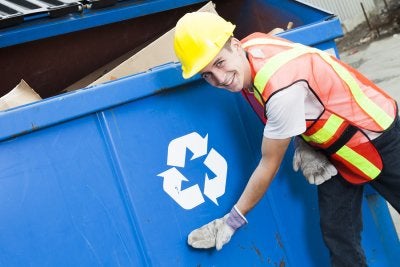
Bottles and Cans
In this day and age, it’s a lot less common to see someone throw an aluminum can or a plastic bottle into a garbage rather than a recycling bin compared to just a few years ago. Containers that hold sports drinks, sodas, and beer are extremely recyclable, and it takes very little effort on the part of the consumer. Aluminum is so recyclable that the next can of soda you buy might be made from a can that you threw away just a couple of months ago. If you aren’t recycling your bottles and cans yet, now is the time to start.
Electronics
It’s tough to escape technology these days, and everyone seems to be waiting at the edge of their seats for the next new mobile phone to come out. What many people don’t realize is that they can recycle their old devices. There are useful materials in your old laptops, desktop monitors, printers, and tablets. Even older electronics like CD and floppy drives, fax machines, and cabled mice can be recycled. Rather than throwing your old electronics out or letting them sit in a bin in your garage, consider recycling them and putting them back into circulation.
Batteries and Bulbs
Some people are unsure how to dispose of certain common items like batteries and fluorescent bulbs. While these items can be recycled and are often accepted, they might come with specialized pickup requirements. Talk to your waste management professional to see how you can go about recycling these items.
-
Make the Parts of Your Waste Management System Effective
Responsible and efficient waste disposal involves the use of a few different components, and you’ll need to know how to use them . Although dealing with waste near Atlanta may seem straightforward on the surface, there are elements that you should consider. Purchasing trash cans, recycling bins, and dumpsters may be a good start, but the way you use them plays an important role. Read on to find out how you can make the parts of your waste management system effective.
The 3 main components of a waste management system are trash cans, recycling bins, and dumpsters. You can find trash cans all over the place, which is crucial when it comes to responsible waste management. The easier it is to find a trash can, the more likely it will be that people throw their garbage away rather than litter. On the same note, you should also make it easy for people to access recycling bins so they can dispose of their recyclable waste in a more environmentally-friendly manner. Dumpsters can be a great choice for areas like apartment complexes and schools, where trash can be regularly picked up at scheduled times. Use these 3 elements to make your waste management system effective.
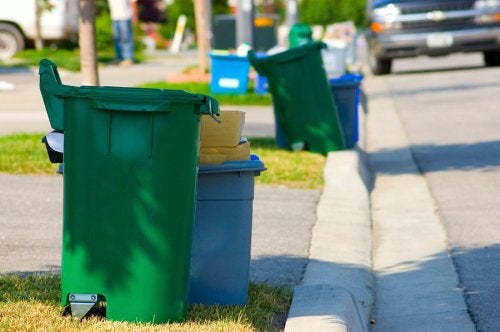
-
How to Implement a Recycling Program in Your School
If you want to bring recycling serving Atlanta to your school, you’ll need to take some time to prepare. You will need help and resources , so start by talking to your coworkers and forming a team. Then think about your waste disposal needs, like how many recycling receptacles you should have on the property. A professional waste management company can help you roll out your recycling program and make sure it all goes according to plan. Here is a closer look at how to implement a recycling program in your school.

Get Everyone on Board
A successful recycling program is a team effort. Everyone needs to be on the same page when you start your recycling program, or it won’t be as effective as it should be. This means there should be a meeting between students, teachers, and staff members to ensure that everyone is aware of the new policies so that they can be carried out successfully. If your school doesn’t already have one, you can put together an environmental club or another organizational team. The more backing you have, the more successful your recycling program stands to be.
Consider Your Needs
Before you can get started with your recycling program, you will need the appropriate materials. Recycling bins are among the most important elements to include. Think about how big your campus is, and consider its layout. Remember that people will be more inclined to use a recycling bin if it’s readily available. If they can’t find one, they might use a trash can instead or even end up littering. The bigger your campus, the more recycling receptacles you should have. Make sure to place them in areas with plenty of traffic to maximize exposure.
Consult Waste Management Services
The point of waste management services is to help empower and encourage people to do their part to protect the environment. The professionals can offer you more advice that you can use to make the most of your recycling program, and they can supply you with the materials and resources you need in order to make it a success.
-
Reducing Industrial Pollution
As the owner or operator of an industrial facility, it is up to you to make sure that your methods and materials are environmentally friendly. Along with practicing smart waste management , there are other practices that you can implement that will help you to cut back on your pollution. With services from a company that specializes in managing waste near Atlanta, you can make sure that your waste disposal and pollution reduction methods are environmentally friendly.
There are several steps that you can take to reduce industrial pollution. Rather than tossing all of your waste in the dumpster, you may want to figure out whether some of these materials can be processed at the recycling center. As you are creating a waste management plan, you may also want to carefully assess that amount of emissions that are generated through your industrial processes. Cutting back on emissions will go a long way towards preserving the environment.
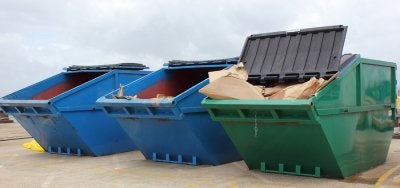
-
Types of Non-Hazardous Industrial Waste
Having an effective and efficient recycling and waste disposal system is important for any business. If your company is part of an industry that produces waste, then understanding which materials are hazardous and which are not can be essential for developing a resourceful waste management program. If you regularly deal with industrial waste near Atlanta , then continue reading to learn about which materials are considered non-hazardous.
Non-hazardous industrial waste falls into several classifications. Class 1 wastes can be potentially threatening to the environment and human health, and examples of these include liquids that can ignite at temperatures exceeding 150 Fº and soils that are contaminated with petroleum hydrocarbons. Class 2 wastes are typically accepted at local landfills and can include items like non-radioactive non-surgical medical waste and depleted aerosol cans. Finally, Class 3 wastes do not decompose or react with other materials, and they are also insoluble. A few examples of Class 3 wastes are glass, rocks, bricks, and some plastics.
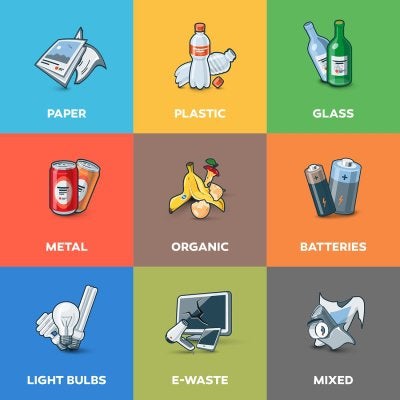
-
The Impact of the Recycling Industry
When you toss a used soda can into a recycling bin for aluminum materials, you may not give much thought to where it goes after or what type of impact that simple action can have. Watch this video to learn how recycling your waste near Atlanta impacts society and the environment.
For over 200 years, the recycling industry has provided countless benefits for the environment and the economy. When you place your recyclable waste into a recycling bin, it is processed and converted into a clean, high-quality product. This means that new items can be created with much less environmental impact. Also, in the United States alone, this industry directly employs more than 140,000 people, making it incredibly beneficial to the economy.
-
A Look at Different Types of Industrial Waste
Businesses and consumers all over the country depend on industrial plants to do the heavy lifting involved with production and manufacturing. As you can imagine, manufacturing plants produce a large amount of waste that has to go somewhere. Industries have the added challenge of ensuring that their waste doesn’t contaminate the surrounding environment. Here’s a quick look at the types of industrial waste that a waste management company in Atlanta may end up handling.
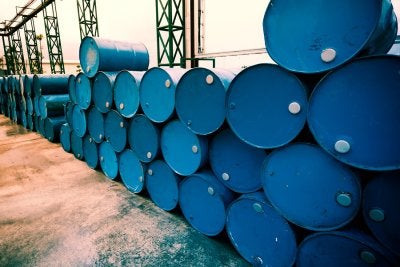
Recyclable Materials
Much of the waste produced or received by industries can be recycled. The trick is to determine exactly which items can be recycled and make sure they make it to the appropriate facilities. For instance, an industrial plant may receive thousands of boxes full of materials necessary for production. Once the contents of those boxes are removed, the boxes themselves can be recycled.
Non-Recyclable Waste
Of course, not everything can be recycled. There are many items that will need to be picked up by a waste management company and delivered to a landfill, or else reused in a more creative manner. Working with waste experts to identify the proper disposal methods for certain materials can help ensure that your plant is in compliance with the law.
Manufacturing Byproducts
Manufacturing plants are hard at work every day producing products that are shipped around the world. As you can imagine, there are also plenty of byproducts left on the facility floor. Much of the time these byproducts can be collected and reused for other industrial purposes—other times they need to be recycled or otherwise disposed of.
Hazardous Waste
Manufacturing millions of units of product can be messy business. Many industries rely on hazardous materials to create their products in a manner that is consistent with consumer expectations. However, these industries are responsible for ensuring that any hazardous materials are disposed of properly, both for the sake of their employees and the surrounding environment.
-
Why Should Your Business Use a Baler?
Space is a constant concern among business owners. For many, the availability of space allows for the storage more merchandise, which can translate to higher sales. If your storeroom or warehouse is full of paper, cardboard, and other forms of waste, then you probably don’t have enough space for merchandise and other useful items. By renting a baler from a waste management company in Atlanta, you can break down your waste into compact bales and free up more space for your business.
There are a number of other benefits that come with renting a baler. For one, consolidating your waste can reduce the total number of waste disposal trips you make and help bring down the costs associated with waste. Under some circumstances, you may even be able to turn your recycling efforts into a whole new revenue stream. There are many businesses that can benefit from a baler, including distribution centers, department stores, office complexes, supermarkets, and large restaurants. If you have a lot of cardboard or paper that you’re not sure what to do with, talk to a waste management company near you about renting a baler.
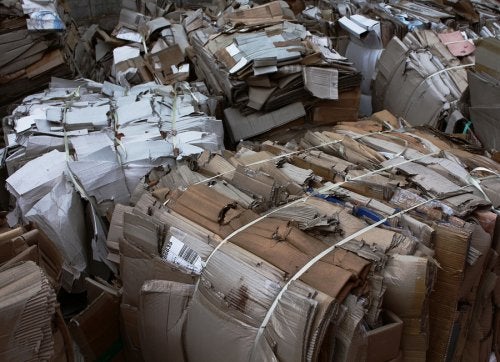
-
The Importance of a Workplace Recycling Program
The typical office environment creates significant amounts of waste paper, cardboard, and other materials. Rather than sending these paper and plastic products to the dumpster, you may want to consider planning and implementing a recycling program for your business. With assistance form a waste disposal company that specializes in recycling in Atlanta, you will be able to create a recycling program that is easy for all of your staff members to follow. When you start recycling, you will be amazed at the amount of recyclable waste that is generated by your business. Here is a look at the importance of a workplace recycling program.
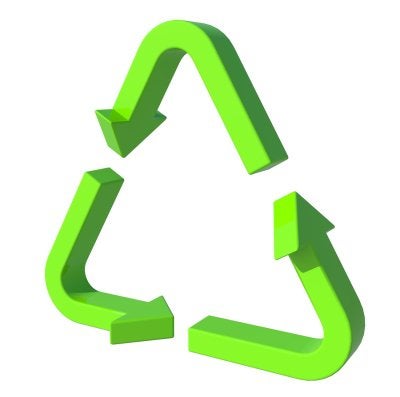
Improve Environmental Impact
A workplace recycling program will help you improve the environmental impact of your business. With many companies choosing to go green with their management and business practices, creating a workplace recycling program is a great way to join the eco-conscious revolution. Taking steps to reduce your carbon footprint and protect natural resources through recycling can also help you draw in new customers and clients who are environmentally minded.
Reduce Average Costs
When you create a recycling plan for your workplace, you can also help to reduce your average operating costs. Recycling paper, plastic, and metal goods will help your employees improve their awareness of the materials that they are using on a daily basis. As a result, you may find that your workers have improved mindfulness regarding conservation and reusing supplies. Over the course of a year, even small recycling measures can translate to significant cost savings.
Raise Company Awareness
When you start a new recycling program in your business, this is also a fantastic opportunity to promote the eco-conscious image of your company. For example, you may want to send out a press release that offers additional information about the new recycling measures that you are taking in your workplace. Even making initial steps towards creating a recycling plan will help boost your image and profile with your community and customers.
-
Examining Common Types of Manufacturing Waste
Manufacturing facilities rely on efficiency and streamlined production methods in order to create their products. However, even the most efficient manufacturing plants are bound to generate some form of waste. By working with a company offering waste management and recycling near Atlanta, you can reduce the amount of materials that you discard during the manufacturing process, while also making sure that your waste is disposed of in a safe and responsible manner. If you are creating a waste disposal plan for your manufacturing plant, read on to learn more about the most common types of manufacturing waste.
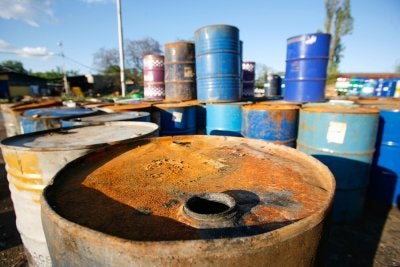
Solid Waste
Solid waste is a term that describes any paper, plastic, metal, or carbon based materials that are left over after the manufacturing process is completed. Some examples of solid waste include cardboard, scrap metals, or packaging materials. While some solid waste must be thrown in a dumpster, other forms of waste can be easily recycled. Recycling paper and cardboard can help you cut back on the carbon footprint of your manufacturing process.
Chemical Waste
Depending on the nature of the manufacturing process, certain facilities may generate large amounts of chemical waste. Unlike solid waste, which can be placed in a bin for disposal, chemical waste must be contained using special disposal methods. Many types of chemicals can cause environmental harm when they are not disposed of in a proper manner. Your waste management specialists can advise you on best chemical waste disposal practices for your business.
Toxic Waste
Toxic waste is an unavoidable byproduct of many manufacturing methods. While you may not be able to reduce the toxicity of certain kinds of waste, you can make sure that any toxic substances that are created in your plant are not allowed to contaminate the surrounding environment. Toxic waste disposal and management is regulated by governmental organizations, so you will want to make sure that your disposal plan is on par with environmental regulations for your county or state.
RECENT POSTS
categories
- Uncategorized
- Waste Management Atlanta
- Waste Disposal and Recycling
- Hazardous Waste Disposal
- Chemical waste removal
- solid waste removal
- R3 Program
- Sustainable Organizations
- Sustainable Waste Removal
- Commercial Waste Removal
- Materials Management Program
- Dumpster Rental
- Roll Off Dumpsters
- Construction Site Waste Removal
- Sustainability
- Recycling in Atlanta
- Industrial Recycling
- Industrial Waste Removal Services
- Southern Waste & Recycling
- Waste Removal Atlanta
- Waste Specialists
- Atlanta
- Infographic
- Front Load Dumpsters
- Rear Load Dumpsters
- Reusable Electronics
- Dump Truck Atlanta
- Recyclable Electronics
- Trash Compactors
- Recycling
- Recycling Program
- Office Recycling
- Metal Recycle
- Electronic Waste
